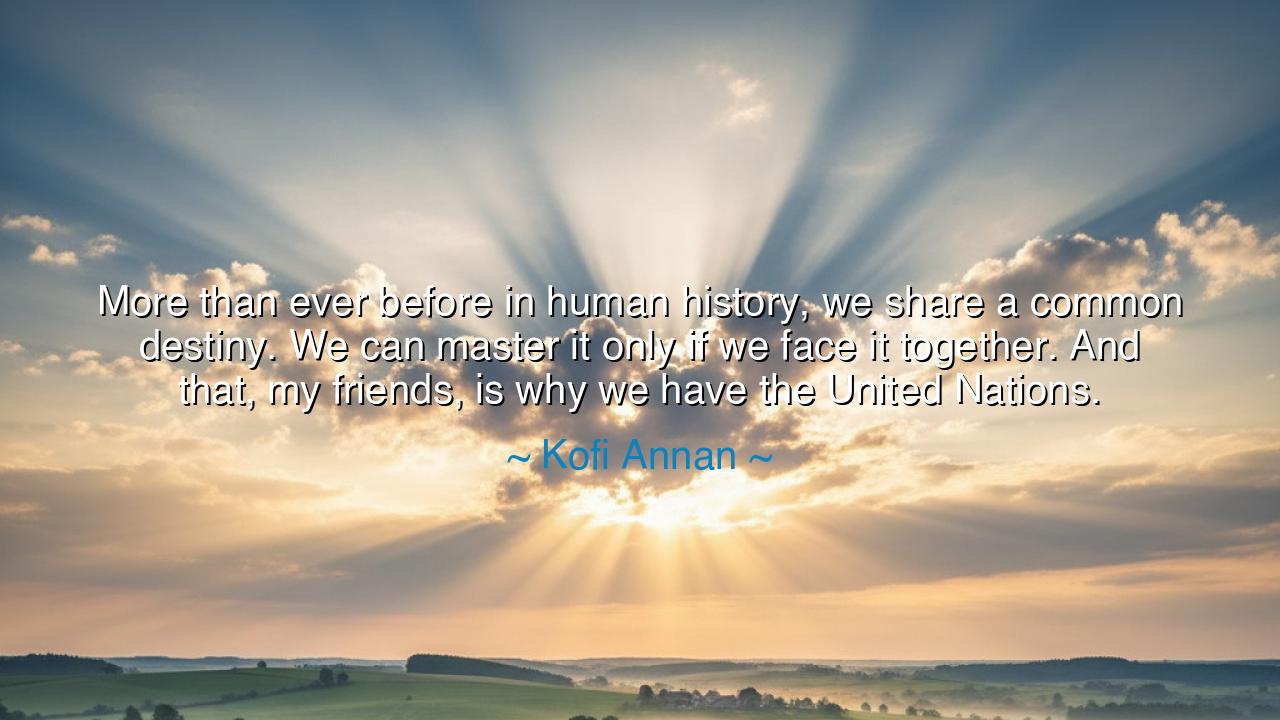
More than ever before in human history, we share a common
More than ever before in human history, we share a common destiny. We can master it only if we face it together. And that, my friends, is why we have the United Nations.






The noble statesman Kofi Annan, who once bore the mantle of Secretary-General of the United Nations, spoke these immortal words: “More than ever before in human history, we share a common destiny. We can master it only if we face it together. And that, my friends, is why we have the United Nations.” In these words lies the essence of humanity’s highest calling — the recognition that our fate, though scattered across nations and tongues, is woven of one fabric. His voice was not that of mere diplomacy, but of ancient truth reborn in the modern age: that unity is not an option, but the very condition of survival.
When Kofi Annan uttered these words, the world stood at a crossroads. The old empires had fallen, yet new divisions had risen — between rich and poor, powerful and weak, East and West, belief and disbelief. The Cold War had ended, but the war of human indifference had begun anew. Annan, a son of Ghana, a servant of peace, looked beyond the banners of nations and saw one planet trembling beneath the same sun. He saw that the challenges of his time — war, famine, disease, and climate — were not confined by borders. And so he proclaimed a truth as old as civilization itself: the destiny of humankind is shared, and only together can we master it.
From the dawn of history, the story of humankind has been a struggle between division and unity. When the tribes of ancient Mesopotamia built their cities and irrigation canals, they learned that cooperation could turn desert into abundance. Yet when pride and envy grew, those same cities turned against one another, and their towers crumbled to dust. The lesson is eternal: where men stand together, they flourish; where they stand apart, they perish. Annan’s words are an echo of this timeless law — a call to remember that survival and greatness are born not of isolation, but of solidarity.
Consider the tale of World War II, that greatest of human tragedies, from whose ashes the United Nations itself arose. The nations of the earth, scarred by unimaginable destruction, gathered not to celebrate victory, but to prevent another catastrophe. They looked upon the ruins of their own making and declared, “Never again.” From their pain was born an institution not of conquest, but of hope — a council where enemies might speak before they struck, where peace might be built by dialogue, not by fire. Kofi Annan’s quote stands upon this foundation. He reminds us that the purpose of the United Nations is not perfection, but perseverance — to keep alive the fragile flame of cooperation in a world often drawn to darkness.
But Annan’s wisdom extends beyond governments and generals; it speaks to every human heart. For in truth, the common destiny he speaks of is not only that of nations, but of individuals. The air we breathe, the oceans that cradle our continents, the invisible threads of technology that bind us — all remind us that we are now one family, whether we wish it or not. The sickness of one spreads to all; the despair of one corner of the earth can ignite the fury of another. Thus, in our age, to care for others is to care for ourselves. The walls we build to divide will one day become the prisons of our own making.
And yet, the path of unity is not easy. It demands patience, humility, and sacrifice. It asks us to see the face of a stranger and recognize our own reflection. It asks nations to yield pride for peace, and individuals to choose empathy over indifference. This, Annan knew, was the greatest challenge of the modern world — not the conquest of nature, but the conquest of selfishness. To face our destiny together means to listen, to compromise, to forgive. It is not weakness that builds peace, but courage — the courage to put aside vengeance, the courage to hope when history teaches despair.
Therefore, let this teaching endure: that the United Nations is not merely a building of marble and flags, but a symbol of the human spirit striving toward harmony. And even beyond the halls of diplomacy, each of us carries within our hearts a smaller United Nations — the power to unite, to mediate, to build bridges in our daily lives. Let every act of understanding, every gesture of kindness, become a vote for humanity’s future.
So remember, my friends: the world’s destiny is your own. You cannot escape it, but you can shape it. When you see division, choose to mend; when you see suffering, choose to help; when you see ignorance, choose to teach. For as Kofi Annan proclaimed, we share a common destiny, and only together can we master it. The future of the world depends not on the might of nations, but on the unity of souls. Let us, then, face it — not as enemies, not as strangers, but as one people beneath one sky.






AAdministratorAdministrator
Welcome, honored guests. Please leave a comment, we will respond soon